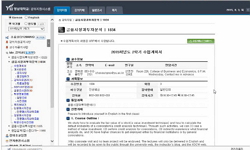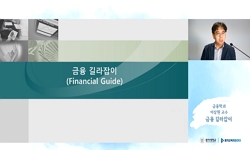Recently, global financial crisis originated from the U.S. cause people around the world to have more interests in financial supervision. Financial services commission and financial supervisory service are trying to change supervision in order to impr...
http://chineseinput.net/에서 pinyin(병음)방식으로 중국어를 변환할 수 있습니다.
변환된 중국어를 복사하여 사용하시면 됩니다.
- 中文 을 입력하시려면 zhongwen을 입력하시고 space를누르시면됩니다.
- 北京 을 입력하시려면 beijing을 입력하시고 space를 누르시면 됩니다.

금융감독제도의 새로운 방향 모색에 대한 법·제도적 고찰 = A Legal and Institutional Study on the New Approach to Financial Supervisory Regime
한글로보기https://www.riss.kr/link?id=A101824303
- 저자
- 발행기관
- 학술지명
- 권호사항
-
발행연도
2009
-
작성언어
Korean
- 주제어
-
등재정보
KCI등재
-
자료형태
학술저널
-
수록면
489-520(32쪽)
- DOI식별코드
- 제공처
- 소장기관
-
0
상세조회 -
0
다운로드
부가정보
다국어 초록 (Multilingual Abstract)

Recently, global financial crisis originated from the U.S. cause people around the world to have more interests in financial supervision. Financial services commission and financial supervisory service are trying to change supervision in order to improve Korea`s financial supervision, emphasizing Principle-Based Regulation, Risk-Based Regulation and Preventive Supervision System. Principle-Based Regulation is meaningful in terms of effective resource distribution. This approach focuses on principles and results beyond intelligent-centered supervision dealing with details about how financial companies do their business. Risk-Based Regulation intends to protect property rights of financial clients and ensure stable financial markets by estimating and controlling risks of each financial organization rather than simply meeting the purpose of following relevant regulations and laws. This approach is involved in risk data collection/analysis/estimation and risk reduction process and related supervisory actions. Meanwhile, distribution of supervision burden through self-regulatory organization is required to implement this approach. More specialized organization must be in charge of some administrative authorities required to maintain national economic order, ultimately, maximizing efficiency. That is, relevant administrative organizations must take responsible for any actions and results. In relation to change in supervision, supervision through administration persuasion. For administration guidance, non-power factual behaviors have effects on factual behaviors, causing problems. Administrative process is aimed at withdrawing general administrative processes and preventing any damage in rights. New approach of supervision is meaningful in that it improves market efficiency and ensures effective use of supervision resources. However, this new approach must harmonize with the existing rule-based methods to maximize its efficiency. Ultimately, it is very important to find out the best association in changing paradigm.
동일학술지(권/호) 다른 논문
-
- 중앙법학회
- 김종천(Jong Cheon Kim)
- 2009
- KCI등재
-
- 중앙법학회
- 오세혁(Se Hyuk Oh)
- 2009
- KCI등재
-
- 중앙법학회
- 김혁기(Hyeok Ki Kim)
- 2009
- KCI등재
-
- 중앙법학회
- 이달휴(Dhal Hugh Lee)
- 2009
- KCI등재




 KCI
KCI DBpia
DBpia







